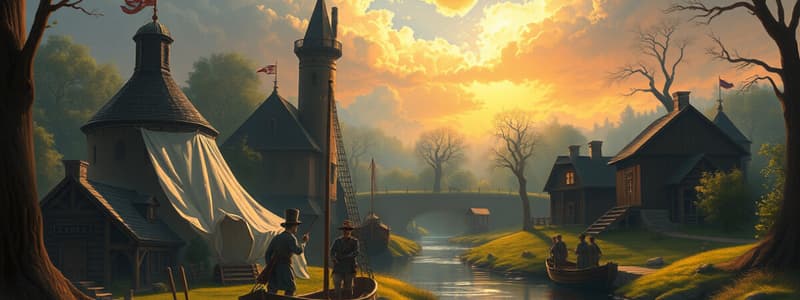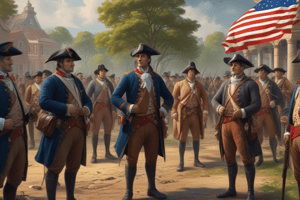Podcast
Questions and Answers
What were the three types of colonies in British America?
What were the three types of colonies in British America?
- Charter colonies
- Proprietary colonies
- Royal colonies
- All of the above (correct)
What is a charter colony?
What is a charter colony?
A charter colony was established by groups of settlers who had been given a charter or a grant of rights and privileges.
What is a proprietary colony?
What is a proprietary colony?
A proprietary colony is run by individuals or groups to whom land was granted.
What is a royal colony?
What is a royal colony?
What colonies were charter colonies?
What colonies were charter colonies?
What colonies were proprietary colonies?
What colonies were proprietary colonies?
What colonies were royal colonies?
What colonies were royal colonies?
What colony does the textbook fail to include in a category?
What colony does the textbook fail to include in a category?
According to a site, how many types of colonies were there and what were their names?
According to a site, how many types of colonies were there and what were their names?
What colonies were considered corporation colonies?
What colonies were considered corporation colonies?
Aside from Rhode Island and Connecticut, what 'organs' made up each of the other colonial governments?
Aside from Rhode Island and Connecticut, what 'organs' made up each of the other colonial governments?
What were three powers royal governors had?
What were three powers royal governors had?
What was one very important power that the governors did not possess?
What was one very important power that the governors did not possess?
How many people usually made up the colonial councils and what were the three functions of the council?
How many people usually made up the colonial councils and what were the three functions of the council?
What were the two powers of the assemblies, or lower house of the legislatures?
What were the two powers of the assemblies, or lower house of the legislatures?
Why did the colonists feel that they were self-governing?
Why did the colonists feel that they were self-governing?
How did the lower house check the power of the governors?
How did the lower house check the power of the governors?
Under what names did the assemblies of colonial America operate?
Under what names did the assemblies of colonial America operate?
What were the qualifications needed for a person to be able to vote in America?
What were the qualifications needed for a person to be able to vote in America?
What is mercantilism?
What is mercantilism?
Flashcards are hidden until you start studying
Study Notes
Types of Colonies
- Three main types of colonies in British America: Charter, Proprietary, Royal.
Charter Colonies
- Established by settlers with a charter granting rights and privileges.
- Governed by elected governors and legislatures, with limited British oversight.
- Examples include Connecticut and Rhode Island.
Proprietary Colonies
- Governed by individuals or groups who received land grants.
- Governors and upper house members were appointed by the proprietors, while the lower house was elected by the people.
- Examples include Delaware, Maryland, and Pennsylvania.
Royal Colonies
- Directly ruled by Britain, with governors and councils appointed by Parliament.
- Led to conflicts with colonists over governance.
- Examples include Georgia, Massachusetts, New Hampshire, New Jersey, New York, North Carolina, and Virginia.
Unclassified Colony
- South Carolina was not classified in a specific category in certain texts.
Corporation Colonies
- Some sources categorize colonies into two types: Corporation and Provincial.
- Corporation colonies included Massachusetts, Rhode Island, and Connecticut.
Colonial Government Structure
- Governed by a combination of a crown-appointed governor, a council, and an elected assembly.
- Council functions included advising the governor, serving as the upper legislature, and acting as the highest court.
Powers of Royal Governors
- Could convene, prorogue, or dissolve the legislature and veto laws.
- Commanded the militia and appointed officials, carrying various responsibilities.
Limitation of Governor’s Powers
- Governors lacked control over funds raised through taxation or other means.
Colonial Councils
- Typically composed of 12 members.
- Served as advisers to the governor, the upper legislative house, and often the highest court.
Assembly Powers
- Held primary legislative power, although acts could be vetoed by the governor or overridden by the crown.
- Sole power of taxation, which they guarded fiercely.
Perception of Self-Governance
- Colonists believed they were self-governing due to their power to tax and secure their liberties.
Checks on Governor’s Power
- Assemblies could withhold financial support and salaries to influence the governor’s decisions.
Names of Assemblies
- Operated under various names, including House of Delegates, Assembly of Freeman, and House of Burgesses.
Voting Qualifications
- Requirements included being a white male citizen, landowner, and sometimes meeting religious criteria.
Mercantilism
- Economic theory promoting national wealth through positive trade balance, favoring exports over imports to accumulate monetary reserves.
Studying That Suits You
Use AI to generate personalized quizzes and flashcards to suit your learning preferences.




